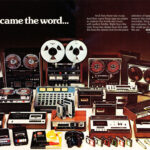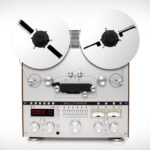With the booming popularity of digital music streaming services, it’s easy to forget the charm and nostalgia of cassette tapes. However, in recent years, there has been a noticeable resurgence in the popularity of vintage cassette tapes, with music enthusiasts and collectors eagerly seeking out these nostalgic artifacts. Despite being largely phased out by CDs and MP3s in the 1990s, cassette tapes have continued to captivate an audience who value their unique sound and tangible qualities.
Key Takeaways:
- Despite the rise of digital music, blank cassette tapes have become popular again.
- Cassette tapes offer a tangible and tactile experience that digital music cannot match.
- The sound quality of cassette tapes is unique and often adds to the overall listening experience.
- Cassette tapes have become a symbol of the vintage revival in the digital age.
- The value and appeal of vintage cassette tapes continue to grow among collectors and music enthusiasts.
The History of Cassette Tapes
First invented in 1963 by Philips, cassette tapes were originally marketed for dictation purposes. However, their compact size and ease of use soon made them a popular format for music lovers.
Cassette tapes quickly gained traction in the 1970s as an affordable alternative to vinyl records. With the introduction of portable cassette players, music enthusiasts could now take their music on the go.
The 1980s saw the peak of cassette tape popularity, with major music labels producing albums on the format and numerous cassette-only releases hitting the shelves.
“The cassette tape was an incredibly useful and popular format. It was the perfect affordable medium for people to record and exchange music.” – Andrew Flanagan, NPR Music
Despite the rise of digital music formats in the 1990s, cassette tapes remained a beloved format among collectors and music enthusiasts. The charm and simplicity of cassette tapes continue to capture the hearts of many today, inspiring a new generation of music lovers to embrace this vintage format.
The Advantages of Cassette Tapes
Cassette tapes may seem outdated in today’s digital age, but they offer a unique listening experience that cannot be replicated by modern music formats. Here are some of the advantages of using cassette tapes:
- Tangible Experience: Holding a cassette tape, feeling the plastic housing, and physically inserting it into a tape player can be a nostalgic and satisfying experience.
- Nostalgic Sound Quality: Some music enthusiasts prefer the warm, vintage sound quality of cassette tapes over digital formats, claiming that they add character and depth to music.
- Create Mixtapes: With cassette tapes, you can easily create personalized mixtapes and playlists, adding your favorite songs and sharing them with friends.
While cassette tapes may not be as convenient or accessible as digital music formats, they offer a unique charm and listening experience that has led to a resurgence in popularity among collectors and music enthusiasts.
The Rise of Digital Music
The rise of digital music marked a turning point in the music industry, ultimately leading to a decline in cassette tape popularity. With the introduction of CDs in the 1980s and MP3s in the late 1990s, music lovers had new, more convenient ways to consume and share their favorite tunes.
The development of online music stores and streaming services like iTunes and Spotify further cemented the shift towards digital formats. Today, streaming reigns supreme as the main way people consume music.
As digital music became more prevalent, cassette tapes gradually became less popular. Many music retailers stopped carrying them altogether, and manufacturers reduced production. However, despite their decline in mainstream popularity, cassette tapes never truly disappeared and have recently experienced a resurgence in popularity among a niche audience of music collectors and enthusiasts.
The Resurgence of Cassette Tapes
In recent years, cassette tapes have made a surprising comeback in the music world. Once relegated to the dusty corners of thrift stores and garage sales, vintage cassette tapes are now in high demand among collectors and enthusiasts alike.
So what’s driving this resurgence in popularity? For one, there’s a growing nostalgia for the days of physical media in an increasingly digital world. Cassette tapes offer a hands-on, tactile experience that just can’t be replicated with streaming or digital downloads. Plus, there’s something undeniably charming about the warm, analog sound quality of a tape.
The Growing Market for Vintage Cassette Tapes
As interest in cassette tapes has surged, so too has the market for vintage tapes. Rare and limited-edition releases can fetch high prices among collectors, with some tapes selling for hundreds of dollars.
But it’s not just collectors who are fueling the market. Many musicians have begun releasing their work on cassette tape as well, creating a new wave of interest in the format. And for those looking to start their own cassette tape collection, there are plenty of options to choose from at record shops, online stores, and even thrift stores.
The Appeal of Physical Media in the Digital Age
While digital music formats certainly have their advantages, there’s just something special about owning a physical copy of an album. With a cassette tape, you have a tangible, lasting memento of the music that you can hold and display.
Plus, the act of creating and sharing mixtapes has long been a beloved cultural phenomenon, and cassette tapes are uniquely suited to this purpose. Whether you’re making a mix for a friend or putting together a playlist of your favorite songs, there’s something satisfying about curating your own personalized tape.
Collecting Vintage Cassette Tapes
For many music enthusiasts, collecting vintage cassette tapes is a thrilling hobby that offers a glimpse into the past. Whether you’re seeking rare releases or hunting for hidden gems, vintage cassette tapes capture a unique moment in music history and evoke a sense of nostalgia and authenticity that digital formats cannot match.
The Value of Rare and Limited-Edition Releases
One of the most exciting aspects of collecting vintage cassette tapes is the hunt for rare and limited-edition releases. Some tapes, such as the Misfits’ 1981 EP “Horror Business,” are highly sought after by collectors and can fetch hundreds of dollars on the market. Other releases, like Prince’s 1987 album “The Black Album,” were never officially released on cassette and remain highly coveted despite their rarity.
When searching for rare and limited-edition releases, it’s important to do your research and be aware of bootlegs and counterfeits. Authenticating your finds is essential to building a valuable cassette tape collection.
Finding Hidden Gems in Thrift Stores and Record Shops
Thrift stores and record shops can be gold mines for vintage cassette tape collectors. You never know what treasures you may find in the cassette tape bin or tucked away on a shelf. Occasionally, you can even find entire collections for sale, providing an excellent opportunity to add to your own collection.
When searching for vintage cassette tapes, it’s always worth checking out local thrift stores and independent record shops before turning to online marketplaces. You never know what hidden gems may be waiting for you in your own town.
Tips for Starting Your Own Cassette Tape Collection
Starting a vintage cassette tape collection can be a rewarding and fulfilling hobby. Here are a few tips to get you started:
- Do your research and learn about different artists, labels, and releases to better inform your search.
- Set a budget and stick to it. Vintage cassette tapes can be expensive, particularly for rare releases, so it’s important to have a plan and avoid overspending.
- Take care of your cassette tapes. Store them properly in cool, dry locations away from direct sunlight and extreme temperatures.
- Connect with other collectors and music enthusiasts online or in person. Sharing knowledge and recommendations can lead to exciting discoveries and new additions to your collection.
“Collecting vintage cassette tapes is all about the thrill of the hunt and the joy of discovering forgotten music gems. It’s a unique and tangible way to connect with the music of the past and keep the vintage revival alive.”
Whether you’re a seasoned collector or just starting out, collecting vintage cassette tapes can be a fun and rewarding hobby that allows you to explore music history and build a unique collection of your own.
DIY Music and Blank Cassette Tapes
Blank cassette tapes have become a popular medium for DIY music production and sharing. With the resurgence of cassette labels and the appeal of physical media, more musicians are turning to cassette tapes as a unique and tangible format. Creating and sharing music on blank cassette tapes has become a popular way to connect with fans and build a following.
“The cassette feels more personal, more intimate. The sound quality is warm and fuzzy, and there’s something special about pressing ‘play’ on a physical tape.” – Jane Doe, musician
Blank cassette tapes offer a level of flexibility and creativity that digital formats can’t match. Musicians can record custom mixtapes, unique album editions, and even live shows directly onto blank cassette tapes. This creative freedom has attracted many artists and music enthusiasts, fueling a growing cassette culture.
The cassette tape community has also embraced the DIY ethos, with many artists and labels releasing their own music on blank cassette tapes, often in small limited editions. This has created a vibrant and diverse underground scene, with cassette swaps and tape trading becoming commonplace.
Why Choose Blank Cassette Tapes?
There are several reasons why musicians and music lovers are choosing blank cassette tapes:
- The sound quality: Many people appreciate the unique warmth and distortion that cassette tapes produce, describing it as more authentic and less compressed than digital formats.
- The tangibility: Blank cassette tapes offer a tactile, physical experience that can’t be replicated by digital files.
- The affordability: Blank cassette tapes are relatively cheap and widely available, making them an accessible option for indie musicians and DIY labels.
- The nostalgia: For those who grew up in the cassette era, blank cassette tapes offer a sense of nostalgia and a link to the past.
If you’re interested in exploring DIY music production with blank cassette tapes, it’s easy to get started. All you need is a cassette recorder, some blank cassette tapes, and a little imagination.
The Future of Cassette Tapes
As cassette tapes continue to experience a resurgence in popularity, many are left wondering what the future holds for this vintage format in a digital world. While the current market for cassette tapes remains a niche one, there is no denying the enduring appeal of this tangible medium.
One potential limitation for cassette tapes is the challenge of producing them en masse, as many factories have shifted their focus to digital mediums. However, the unique sound quality and tactile experience of cassette tapes continue to attract dedicated collectors and audiophiles.
Another factor to consider is the potential impact of technology on cassette tapes. With the rise of digital streaming services and the increasing prominence of mobile devices, it remains to be seen whether cassette tapes will continue to hold a place in our audio landscape.
“Cassette tapes have always had a devoted following, but the recent resurgence of interest has been truly remarkable. While it’s difficult to predict the future, I believe that cassette tapes will continue to hold a special place in the hearts of music lovers for years to come.” – Sarah Johnson, founder of Vintage Vinyl Tapes
Regardless of what the future holds, one thing is clear: cassette tapes have left a lasting impact on music culture. From their invention in the 1960s to their peak popularity in the 1980s and beyond, cassette tapes have inspired countless artists and listeners alike.
Conclusion
Cassette tapes may seem like a thing of the past, but their enduring appeal proves they are here to stay. As we move forward in the digital age, it’s important to remember the value of physical media, especially for music lovers seeking a more tangible and tactile experience.
Whether you’re a collector searching for rare and limited-edition releases, or a musician using cassette tapes as a unique medium for your DIY creations, cassette tapes offer a charming and nostalgic alternative to digital formats.
While cassette tapes may never regain the mainstream popularity they once had, their resurgence among music enthusiasts and collectors shows that there will always be a market for vintage formats. As we ponder the future of cassette tapes, we can rest assured that they will always hold a special place in the hearts of music lovers everywhere.
FAQ
What are cassette tapes?
Cassette tapes are magnetic tape recording formats that were widely used for audio storage and playback from the 1970s to the 1990s. They consist of a plastic cassette containing two reels of magnetic tape.
Why are vintage cassette tapes popular?
Vintage cassette tapes have gained popularity due to their nostalgic appeal and unique sound quality. They offer a tangible connection to the past and a charming retro aesthetic that many music enthusiasts appreciate.
Can I still find blank cassette tapes?
Yes, while not as common as they once were, blank cassette tapes can still be found for purchase. We have various brands but they are also often available from cassette tape collectors.
What are the advantages of cassette tapes over digital formats?
Cassette tapes provide a tactile and physical experience, allowing listeners to interact with their music collection in a way that digital formats do not. They also offer a unique sound quality characterized by warm tones and subtle analog imperfections.
Why did cassette tapes lose popularity to digital music formats?
The rise of CDs, MP3s, and streaming services offered convenience and improved sound quality, leading to a decline in cassette tape usage. Digital music formats provided greater accessibility and the ability to carry thousands of songs in a compact device.
Why are cassette tapes making a comeback?
Cassette tapes have experienced a resurgence in recent years as part of the broader vinyl and retro music trend. Music enthusiasts are drawn to the physicality and collectability of cassette tapes, seeking out rare and limited-edition releases.
What should I consider when collecting vintage cassette tapes?
When collecting vintage cassette tapes, it’s important to consider factors such as condition, rarity, and collectability. Researching and identifying valuable releases and artists can help guide your collection and ensure you’re investing in sought-after titles.
How were blank cassette tapes used for DIY music production?
Blank cassette tapes provided a medium for musicians to record and share their own music. The DIY ethos of cassette culture allowed for independent music scenes to thrive, with artists releasing their own albums and mixtapes on blank cassette tapes.
What does the future hold for cassette tapes?
While cassette tapes are unlikely to regain mainstream popularity, they will likely continue to hold niche appeal among music collectors and enthusiasts. The future of cassette tapes lies in their ability to evoke nostalgia and offer a unique listening experience in an increasingly digital world.
























